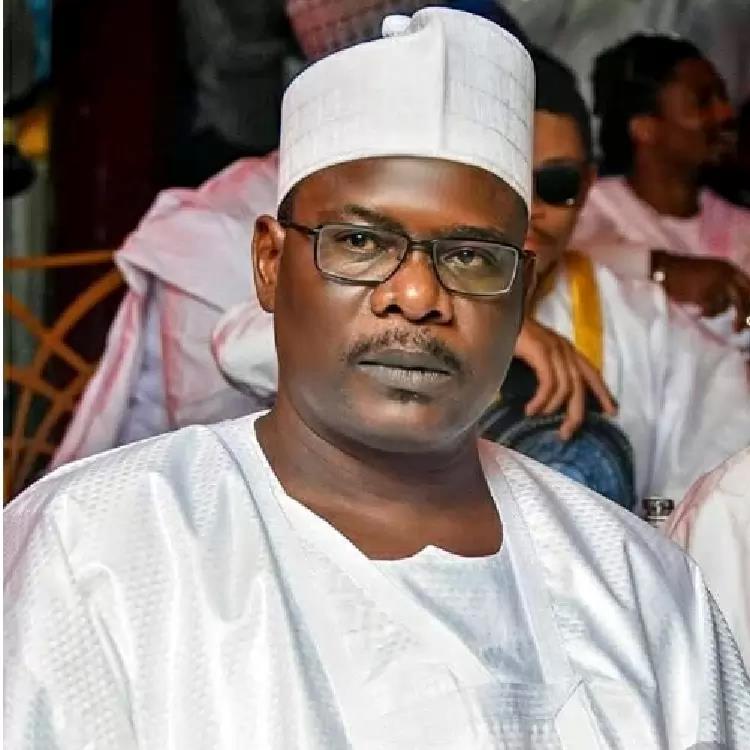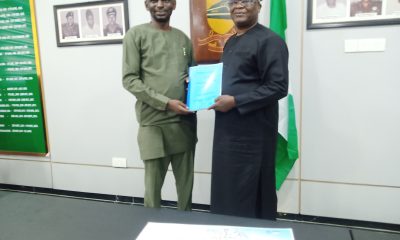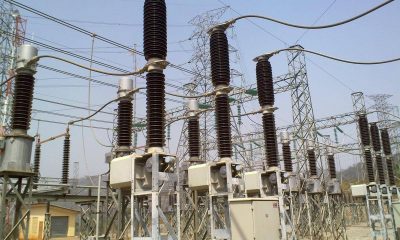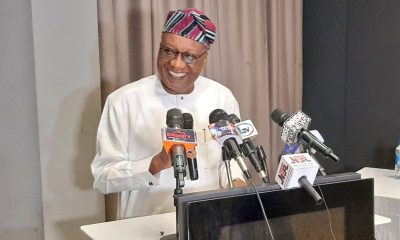News
Salah: Prices of rams shoot up, sell N200,000 to N250,000

Salah: Prices of rams shoot up, sell N200,000 to N250,000
Ahead of the forthcoming Eid-el Kabir celebration, prices of animals used for sacrifice during the annual festival have skyrocketed beyond the reach of many celebrants, Daily Trust Saturday reports.
Every year during the Islamic month of Dhul Hijjah, Muslims around the world who have the means, slaughter animals like sheep, goat, cow or camel – to reflect the Prophet Ibrahim’s willingness to sacrifice his son Ismail, for the sake of God.
While it is not the only livestock acceptable, a narration in Sahih Muslim records that the Prophet Muhammad (pbuh) sought out horned, white rams to sacrifice during the Eid el-Kabir, as the ram of Prophet Ibrahim had been.
At least, one third of the meat from the animal should go to the poor or vulnerable people.
Like that of ram, prices of cow and camel have also hit the roof top, as findings by our correspondents revealed.
The hike in the cost of basic commodities in Nigeria has reflected itself boldly in the livestock sector, a situation that is likely to deny average Muslims the means to partake in the annual sacrifice amidst economic crunch.
Findings by Daily Trust Saturday in Abuja, Kano, Yobe, Jigawa, Katsina, Lagos, and Port Harcourt, among others, showed that the cost of rams currently hover between N150,000 and N1 million, depending on the size and the location one is buying from.
Stakeholders interviewed blamed the situation on the insecurity around some major rearing states in the North West and North East, devaluation of the naira as well as withdrawal of fuel subsidy, which have in addition affected the price of animal feeds and the cost of transportation.
The Sultan of Sokoto, Alhaji Muhammadu Sa’ad Abubakar III, had declared Friday, June 7, 2024, as the First Day of Dhul Hijjah 1445AH and Sunday, June 16th, which will be equivalent to the 10th of Dhul Hijjah will be marked as this year’s Eid-El-Kabir.
Low patronage in Abuja
Few days to the Sallah celebration, sales have yet to pick up as noticed during a visit to the Abuja main livestock market located in the Dei-Dei area in the Federal Capital Territory, FCT.
This is a sharp contrast with the past when the market served as a rallying point for suppliers and off-takers well ahead of the Sallah festivity.
A livestock merchant in the market, Uzairu Dan-Kudalo, said that the insecurity problem bedevilling some major rearing states, like Zamfara, Sokoto, and Katsina, is affecting the sector, sending many stakeholders out of the business.
READ ALSO:
- Why states cannot pay N60,000 new minimum wage – Govs
- Tinubu best presidential candidate in 2023, says Ex-Peter Obi campaign director Doyin Okupe
- Kaduna private varsity to permanently forfeit all assets
“I know a lot of our members from Zamfara State that lost their capital to this problem just in one fell swoop, after their communities were attacked by bandits or run into their trap along the way. You can see how our animals’ stalls look empty, and it is less than 10 days to the Sallah festivity.
“From Zamfara State alone, we used to receive a supply of no less than 30 trailers during this period, with each trailer loading between 200 and 250 rams,” he said.
“This does not include other mini trucks like canter, which used to supply without getting any attention. But as I am talking to you today, we are yet to receive any kind of supply from there. If you are talking about other states, by this time, a single merchant alone from other states like Kano, Jigawa, or Yobe, would supply about 200 rams into the market. However, many of them can no longer afford a capital of 50 rams now, due to the cost of transportation and the naira devaluation”, he said.
He said bulk buyers and individuals were also not forthcoming.
“By now, I would have finished with the supply of rams to all my regular customers who may decide to keep the animals here, or transport them to their agency, for onward distribution among the beneficiaries. But I am yet to witness this gesture so far,” he said.
Another trader, Yahuza Abdullahi, said that some of them that usually travel to the neighbouring countries like Niger, Chad, or Cameroun to supply the animals are now constrained as a result of the naira devaluation, which according to him has given an edge to the traders that come from the Francophone currency nations.
“Their currency (CFA) has greater value compared to the naira, and as such, nothing you can buy from those countries and expect to make any gain out of it there.
“Rather, the traders of those countries stand to gain a lot when they convert their currency to naira and export our commodities,” he said.
The price of ram has either tripled or doubled when compared with how it went last year.
The same thing goes to the animal feed and cost of transportation.
Given the breakdown of ram price, based on their categories, a trader, Abdullahi Adamu, said the smallest animal that attained the level of sacrifice currently sold between N120,000 and N150,000.
He said such categories of rams were sold between N70,000 and N100,000 last year.
According to him, a middle-sized ram, which sold between N150,000 and N180,000 last year now costs between N250,000 and N300,000.
There are also jumbo-sized rams, which cost from N800,000 and N1.4 million.
Same rams were said to be sold last year, at the rate of N500,000, while the biggest of all, sold at N1.1 million last year.
The same scenario is playing out at the animals’ feed commodity.
A breakdown of the commodity in the market indicates that a bag of animals’ feed extracted from raw beans is now sold between N13,000 and N14,000 per bag, depending on product quality and location. This is in contrast to the N7,000 to N8,000 sold last year.
Same goes to the dried groundnut leaves, which are currently sold at between N5,000 and N6,000, compared to previous year, when it was sold at between N3,500 and N4,000.
READ ALSO:
- UniAbuja VC to appear in court over governing council crisis
- Dozens killed near Sudan’s capital as UN warns of soaring displacement
- Police arrest adulterated drink importer in Lagos
For the harvested corn by-product, its bag costs between N6,000 and N7,000, compared to the previous price of N4,000 and N4,500.
A bag of grounded maize by-product, or dusa in Hausa, is sold at between N18,000 and N20,000, compared to its previous price of N9,000 to N10,000 last year.
In the transportation sector, the traders said a canter truck supplying rams from Katsina or Kano that they paid between N200,000 and N250,000 last year, now goes for between N400,000 to N500,000.
Same truck transporting the animals from either Adamawa or Yobe states in the North East costs around N700,000, in contrast to between N400,000 and N500,000 paid in the past.
It was further learnt that transporting rams in trailer trucks from Mubi, in Adamawa State, a town neighbouring Cameroon Republic, now costs up to N1.5 million, as against last year’s N800,000.
They’re beyond our reach
An Abuja resident, Alhaji Shuaib Hassan who went to buy ram at the livestock market on Wednesday, left there disappointed, as according to him, the N200,000 he budgeted for the kind of ram he bought at N150,000 last year could not get him a ram as it now costs N300,000.
He said he was contemplating returning to the market on Saturday when more traders, especially those from the rural areas, are expected to arrive.
Sani Yusuf said he found succour when he bought two rams at his home town of Bichi, in Kano State, two months ago.
“I bought them at the rate of N150,000, and so far, I have sent about N10,000 for their feeding. I am expecting to pay an additional N10,000 for their transportation from the area to Abuja in the company of other animals tomorrow,” he said.
There was the same lamentation from some roadside ram markets visited in the neighbouring Niger State.
A ram trader in Suleja town in the state, Abubakar Kwamba, predicted the likely drop in ram supply, as well as patronage of buyers this year, owing to the present economic reality.
“We are about 20 traders that supplied ram to this makeshift market last year. But as I am speaking to you now, there are only three of us that arrived, and still with lower supply, compared to what we brought last year. I could only afford to buy 12 rams this year, against 20 that I bought last year”, he said.
Sale outlets springing up in Kano
Roadside livestock markets are springing up in Kano, our correspondent reports.
At Kofar Naisa, where the sacrificial animals are available for would-be buyers, a trader, Yusuf Sani said they were bringing the animals from outside the state, in the hope of making little profit.
He said that the economic situation in the country makes everything look bleak at the moment, but he was hopeful that in the next few days, the market will record improved patronage.
READ ALSO:
- Danish PM attacked in Copenhagen, man arrested
- UN adds Israel to list of militaries committing violations against children
- 2026 W’Cup: Super Eagles walk tight rope, play 1-1 with South Africa in Uyo
He said the price of a big ram starts from N400,000, while medium-sized ones go for N300,000. A small-sized ram costs N100,000.
Another ram seller, Aminu Gwagwarmaya from Hauran Makaranta, said with N150,000, one can get a modest ram in the market.
Hajiya Ummah Kulthum Muhammad Lawan was seen at one of the markets.
She said the money she used and bought many rams last year, which she shared with relatives, will not give her half the number this time around.
“The price for each ram has almost tripled and only God can see us through,” she said.
At the Kofar Naisa Market, the price of camels range from N780,000, depending on the size.
It is permissible for three to seven people to contribute money to buy a camel or a cow for sacrifice and share the meat, clerics said.
The situation in Jigawa State is the same as merchants at Dutse temporary animals’ market lament low patronage.
One of them, Shafiu Hamisu, said scarcity of rams in the state has forced them to resort to buying from neighbouring states.
He said the prices of rams have increased significantly, with a big ram now selling for between N200,000 and N250,000, compared to less than N120,000 in 2023.
Sani Muhammad Bashir, a buyer at Dutse temporary ram market, said he will manage to buy the ram, though the price is very costly.
He called on the government to look into the matter and make things easy for the masses by finding ways to tackle inflation and provision of affordable means of transportation.
Yobe traders in a fix
In Yobe State, livestock sellers have decried low patronage of the sacrificial animal ahead of the Eid-el-Kabir.
The sellers said buyers are reluctant to come forward, saying this may not be unconnected with the high cost of the animals at a time people were struggling to buy food for their families.
The few buyers seen were lamenting over the price of ram and cow, which has increased significantly compared with last year.
A buyer at the livestock market in Potiskum, Adamu Umar, told Daily Trust Saturday that “A cow that you can buy at the cost of N400,000 last year, has now been increased to N650,000, while a bull, which we used to buy at N1,000,000 has now skyrocketed to N1,600,000.
“The situation of the market is not encouraging and by the body language of the buyers, you will understand that many people will not slaughter cows this year,” he said.
MD Adechu, a buyer from Lagos told Daily Trust Saturday that cattle are very expensive even though the Potiskum market is one of the largest livestock markets in the North.
“I don’t know what is happening; please, our government should make things easy for the masses and its citizens”, he said.
Abubakar Usman, a dealer said the price of a medium-sized ram starts from N100,000.
Another ram seller, Alhaji Zakari Yau, told Daily Trust Saturday that most of the buyers are from the southern part of the country.
In Lagos, Abduwasiu Ibrahim, a middleman, said rams and cattle are cheaper in the North.
“The ram that you can buy for N120,000 will cost you around N220,000 here; and a cow of N1,000,000 in the North will be sold at around N1,500,000 here,” he said.
READ ALSO:
- Sanwo-Olu opens SDGs multi-storey Sickle Cell Centre at LASUTH
- Chery lights up Lagos Motor Fair with Tiggo 8 Pro launch
- Woman bags 25 years imprisonment for hiring hitmen to kill her husband
He said the situation is the same in Port Harcourt, Enugu and Uyo.
“The reason is the cost of transportation and other challenges on the highway. You have to pay a lot of money to many tax collectors,” he said.
The same thing goes to the animal feed and cost of transportation.
Given the breakdown of ram price, based on their categories, a trader, Abdullahi Adamu, said the smallest animal that attained the level of sacrifice currently sold between N120,000 and N150,000.
He said such categories of rams were sold between N70,000 and N100,000 last year.
According to him, a middle-sized ram, which sold between N150,000 and N180,000 last year now costs between N250,000 and N300,000.
There are also jumbo-sized rams, which cost from N800,000 and N1.4 million.
Same rams were said to be sold last year, at the rate of N500,000, while the biggest of all, sold at N1.1 million last year.
The same scenario is playing out at the animals’ feed commodity.
A breakdown of the commodity in the market indicates that a bag of animals’ feed extracted from raw beans is now sold between N13,000 and N14,000 per bag, depending on product quality and location. This is in contrast to the N7,000 to N8,000 sold last year.
Same goes to the dried groundnut leaves, which are currently sold at between N5,000 and N6,000, compared to previous year, when it was sold at between N3,500 and N4,000.
For the harvested corn by-product, its bag costs between N6,000 and N7,000, compared to the previous price of N4,000 and N4,500.
A bag of grounded maize by-product, or dusa in Hausa, is sold at between N18,000 and N20,000, compared to its previous price of N9,000 to N10,000 last year.
In the transportation sector, the traders said a canter truck supplying rams from Katsina or Kano that they paid between N200,000 and N250,000 last year, now goes for between N400,000 to N500,000.
Same truck transporting the animals from either Adamawa or Yobe states in the North East costs around N700,000, in contrast to between N400,000 and N500,000 paid in the past.
It was further learnt that transporting rams in trailer trucks from Mubi, in Adamawa State, a town neighbouring Cameroon Republic, now costs up to N1.5 million, as against last year’s N800,000.
They’re beyond our reach
An Abuja resident, Alhaji Shuaib Hassan who went to buy ram at the livestock market on Wednesday, left there disappointed, as according to him, the N200,000 he budgeted for the kind of ram he bought at N150,000 last year could not get him a ram as it now costs N300,000.
He said he was contemplating returning to the market on Saturday when more traders, especially those from the rural areas, are expected to arrive.
Sani Yusuf said he found succour when he bought two rams at his home town of Bichi, in Kano State, two months ago.
“I bought them at the rate of N150,000, and so far, I have sent about N10,000 for their feeding. I am expecting to pay an additional N10,000 for their transportation from the area to Abuja in the company of other animals tomorrow,” he said.
There was the same lamentation from some roadside ram markets visited in the neighbouring Niger State.
READ ALSO:
- Police nabs 18-year-old for stealing LED lights on third mainland bridge
- BREAKING: FG increases minimum wage offer to ₦62,000
- MURIC kicks as WAEC supervisor disallows use of hijab
A ram trader in Suleja town in the state, Abubakar Kwamba, predicted the likely drop in ram supply, as well as patronage of buyers this year, owing to the present economic reality.
“We are about 20 traders that supplied ram to this makeshift market last year. But as I am speaking to you now, there are only three of us that arrived, and still with lower supply, compared to what we brought last year. I could only afford to buy 12 rams this year, against 20 that I bought last year”, he said.
Sale outlets springing up in Kano
Roadside livestock markets are springing up in Kano, our correspondent reports.
At Kofar Naisa, where the sacrificial animals are available for would-be buyers, a trader, Yusuf Sani said they were bringing the animals from outside the state, in the hope of making little profit.
He said that the economic situation in the country makes everything look bleak at the moment, but he was hopeful that in the next few days, the market will record improved patronage.
He said the price of a big ram starts from N400,000, while medium-sized ones go for N300,000. A small-sized ram costs N100,000.
Another ram seller, Aminu Gwagwarmaya from Hauran Makaranta, said with N150,000, one can get a modest ram in the market.
Hajiya Ummah Kulthum Muhammad Lawan was seen at one of the markets.
She said the money she used and bought many rams last year, which she shared with relatives, will not give her half the number this time around.
“The price for each ram has almost tripled and only God can see us through,” she said.
At the Kofar Naisa Market, the price of camels range from N780,000, depending on the size.
It is permissible for three to seven people to contribute money to buy a camel or a cow for sacrifice and share the meat, clerics said.
The situation in Jigawa State is the same as merchants at Dutse temporary animals’ market lament low patronage.
One of them, Shafiu Hamisu, said scarcity of rams in the state has forced them to resort to buying from neighbouring states.
He said the prices of rams have increased significantly, with a big ram now selling for between N200,000 and N250,000, compared to less than N120,000 in 2023.
Sani Muhammad Bashir, a buyer at Dutse temporary ram market, said he will manage to buy the ram, though the price is very costly.
He called on the government to look into the matter and make things easy for the masses by finding ways to tackle inflation and provision of affordable means of transportation.
Yobe traders in a fix
In Yobe State, livestock sellers have decried low patronage of the sacrificial animal ahead of the Eid-el-Kabir.
The sellers said buyers are reluctant to come forward, saying this may not be unconnected with the high cost of the animals at a time people were struggling to buy food for their families.
The few buyers seen were lamenting over the price of ram and cow, which has increased significantly compared with last year.
READ ALSO:
- Rainstorm destroys 100 houses in Plateau
- Four suspected terrorists surrender, blame severe hunger
- Enugu monarch, 4 others remanded over murder of policemen
A buyer at the livestock market in Potiskum, Adamu Umar, told Daily Trust Saturday that “A cow that you can buy at the cost of N400,000 last year, has now been increased to N650,000, while a bull, which we used to buy at N1,000,000 has now skyrocketed to N1,600,000.
“The situation of the market is not encouraging and by the body language of the buyers, you will understand that many people will not slaughter cows this year,” he said.
MD Adechu, a buyer from Lagos told Daily Trust Saturday that cattle are very expensive even though the Potiskum market is one of the largest livestock markets in the North.
“I don’t know what is happening; please, our government should make things easy for the masses and its citizens”, he said.
Abubakar Usman, a dealer said the price of a medium-sized ram starts from N100,000.
Another ram seller, Alhaji Zakari Yau, told Daily Trust Saturday that most of the buyers are from the southern part of the country.
In Lagos, Abduwasiu Ibrahim, a middleman, said rams and cattle are cheaper in the North.
“The ram that you can buy for N120,000 will cost you around N220,000 here; and a cow of N1,000,000 in the North will be sold at around N1,500,000 here,” he said.
He said the situation is the same in Port Harcourt, Enugu and Uyo.
“The reason is the cost of transportation and other challenges on the highway. You have to pay a lot of money to many tax collectors,” he said.
Salah: Prices of rams shoot up, sell N200,000 to N250,000
Daily Trust
News
US honours Soyinka, Okundaye at African Cultural Festival 2025 Pennsylvania

US honours Soyinka, Okundaye at African Cultural Festival 2025 Pennsylvania
The United States government through the Pennsylvania House of Representatives and the Pennsylvania Senate has honoured the Nobel Laureate Wole Soyinka and the renowned African art icon, Chief Nike Okundaye of Nike Art Gallery, Lagos for their contributions to art in Nigeria and globally.
While Soyinka was conferred with “Distinguished Honors” for his extraordinary contributions to literature, culture, human rights, and global discourse, Nike Okundaye was honored for her revolutionary impact on contemporary African art.
She was recognized for being the pioneer of the Adire resist-dyeing technique, which has seamlessly blended ancestral motifs with modern aesthetics, earning global acclaim, thereby solidifying her legacy as a custodian of African heritage.
The honor was bestowed on them on March 26 at the unveiling of African Cultural Festival 2025 held at the Pennsylvania State Capitol . The festival will take place from September 19 to 20, 2025, in Pennsylvania.
The Senate of Pennsylvania lauded Professor Soyinka for his pioneering role in modern African literature and his relentless advocacy for free speech, social justice, and democracy.
The Pennsylvania House of Representatives, led by Speaker Joanna E. McClinton, also commended him for his unparalleled literary achievements and for inspiring critical thoughts across generations.’
For Okundaye, she was honoured for giving hope to marginalised women, training and equipping over 5,000 women with Adire-making, weaving, and traditional craft skills.
READ ALSO:
- Beg Wike, ex-LP gov candidate Eradiri advises Fubara
- People previously offering me food, drinks now begging for assistance – Obi
- FG says crude oil sale in naira will continue
“Her mission to foster economic independence and cultural continuity has empowered communities across Nigeria and beyond, ensuring that African artistry thrives in future generations,” the House and the Senate stated.
Speaking about the upcoming festival, Wole Adeniyi, the Chief Executive Officer, CEO of ACI234, said the festival was designed to celebrate African heritage, foster international collaboration, and stimulate trade and cultural exchange between Africa, the United States, and the world.
Adeniyi emphasised that the festival will solidify Africa’s cultural influence while creating pathways for sustainable growth and artistic innovation.
He thanked the Pennsylvania House of Representatives, the Senate, and the State of Pennsylvania for honouring the two Nigerian icons of art.
Part of activities lined up for the festival includes the launching of Duduplugs, an innovative digital platform by ACI234 Entertainment LLC, designed to connect creative industries across continents, and elevate Africa’s creative economy.
Commenting on the upcoming event, Festival Director Foluke Michael described the African Cultural Festival as a celebration of tradition and innovation — a vibrant fusion of Africa’s timeless heritage with contemporary expression.
She acknowledged the pivotal role of the Lagos State Government in laying the foundation for this global movement through the Lagos Black Heritage Festival, which was steered by Professor Wole Soyinka during his tenure as Festival Consultant.
“That era gave birth to a cultural renaissance,” Michael noted. “It was during that time that the iconic Rhumble in Lagos — featuring President Bola Ahmed Tinubu and boxing legend Evander Holyfield — became a symbolic moment that planted the seed for what we now know as the African Cultural Festival.”
She further revealed that the official countdown to the 2025 edition will begin in Lagos at the end of April, setting the stage for a global celebration of African excellence.
US honours Soyinka, Okundaye at African Cultural Festival 2025 Pennsylvania
News
Ali Baba spills what Obasanjo told him on how to become Nigeria’s President

Ali Baba spills what Obasanjo told him on how to become Nigeria’s President
Ali Baba, the ace comedian, has revealed political strategies he claims were shared with him by former President Olusegun Obasanjo on how to become Nigeria’s president.
In an interview on Outside The Box, the 59-year-old entertainer said Obasanjo allegedly shared the strategies with him via chat because he thought he was venturing into politics and wanted to guide him.
Ali Baba claimed that Obasanjo emphasised the importance of gaining the support of seven governors, including the Central Bank of Nigeria (CBN) governor, to clinch the presidential seat.
“I was speaking with Obasanjo one time, and he listed some things that are necessary in politics,” the comedian said while picking up his phone to show proof that he documented his conversation with the former president.
“He thought I was going into politics, so he was happy I was talking to him about politics. He said ‘Ali, I’m happy you are catching up with politics, but you still have a lot to learn about how governors and presidents are selected’.
“He said ‘you need seven governors to win an election. Lagos, Bayelsa, Delta, Rivers, Kano, Kaduna and the CBN governor’. Then I said ‘Kano and Kaduna don’t have money,’ he said ‘that is for the numbers’…
“You need 44 of the most popular senatorial districts.”
The comedian, born Atunyota Alleluya Akpobome, also alleged that Obasanjo mentioned the key tasks to be accomplished in the first term to increase the chances of being re-elected.
READ ALSO:
- FCT Minister Wike hosts suspended Rivers assembly members in UK
- NRC, Plateau sign MoU to revive Jos–Kuru train
- Bauchi accountant-general Sirajo Jaja arraigned for alleged N8.3bn fraud
“You need to have awarded 10 contracts and 15% of that contract can give you a marginal impact at the polls. And you must award this contract in your first year of assumption of office,” he said.
“If you don’t do that, then, you can’t ask the people for anything because when you give them at the first year of your getting into office, when it’s time for elections you just tell them ‘Do you want to continue this contract or not’.”
Ali said Obasanjo emphasised the importance of making strategic appointments, including “the chief justice of Nigeria (CJN), controller-general of customs, head of the Nigerian National Petroleum Company (NNPC), inspector-general of police (IGP), and CBN governor”.
The comedian said Obasanjo allegedly advised on steering clear of corrupt governors who are “loaded” and can be “financially useful when needed”.
“He said you must name your CJN, IGP, controller general of customs, head of the NNPC, CBN governor, and you must suspend pending cases of corrupt past governors who are loaded,” he added.

Former President of Nigeria, Olusegun Obasanjo
“Don’t forget that those guys have war chests that they are just sitting and waiting for who they want to align with. No matter how much EFCC milks from them, they still have plenty.
“These are people who were sitting on a monthly federal allocation. Don’t forget that some states that when they get their federal allocation, they don’t touch it.
“They actually add to it because their state’s internally generated revenue is higher than what the federal government gives to them.
“So if the federal government gives them N3, they can add N4 to it and spend N7. When they leave office, EFCC can’t come looking for them because they added money to what the federal government gave them, but you see that internally generated revenue that is their sweat as it is called, it is their money, they generated it themselves. They can determine what they want to do with it.”
Ali Baba alleged that Obasanjo highlighted the importance of securing support from key figures, including foreign countries, the wealthy, religious leaders, and bloggers.
According to him, “he also advised infiltrating opposition parties and strategically influencing delegates by offering incentives to ensure loyalty during elections”.
“This is the meaty part of it, he says ‘Get US or China support because of their businesses in your country, they would support,” he said.
“Get National Association of Nigerian Students, market women, National Union of Road Transport Workers. Unsettle the organized labour. Get 10 of the richest Nigerians on your side. Infiltrate your opposition party and let them decamp for elections.
“So let me explain. You have your party and I want to infiltrate the party. I will send my people to leave my own party and join your own party before the elections. So when the time of election comes, they will then disrupt the whole thing.
“They will probably be the ones they will put in charge of electioneering campaign and you won’t know that the reason they decamped was to make sure that your own campaign doesn’t succeed. So when you are planning, they inform their original party.
“Obasanjo continued saying infiltrate the opposition party, but delegates one year before your congress.
“So I asked how do you buy delegates then he said “you know who and who that would be selected as delegates, give two of his daughters job in the bank, give another’s wife a shop, sponsor another’s trip to Hajj so when the time for election comes and you say this is the person I’m supporting, they won’t mess up because of what you have done.
“While some people are trying to raise money to give dollars, you already have bought their loyalty since. Have a hand in appointing all parties’ chairmen.
“Secure INEC and state rec, blogs, social media, religious leaders, royal fathers, appointment of board of chairman and DGs. Get four constitutional lawyers on retainship.”
Ali Baba spills what Obasanjo told him on how to become Nigeria’s President
News
Tinubu skewed appointments can boomerang, Ndume warns

Tinubu skewed appointments can boomerang, Ndume warns
Senator Ali Ndume (APC Borno South) has faulted the federal as well as political appointments made by President Bola Ahmed Tinubu.
According to him, the President has favoured an ethnic group, contrary to the dictates of the Federal Character guidelines.
Ndume said he was shocked when he read the endless and sectional list of federal political appointees going viral on social media, describing the situation as non-inclusive and not reflecting the ‘Renewed Hope Agenda’ of Mr President.
He spoke on Arise News (Prime Time) on Monday, which was monitored by our correspondent.
He pointed out that as a lawmaker, and based on his observation, President Tinubu’s appointments so far violated federal character and should be corrected.
The senator, who is a member of the ruling APC, has always been vocal and a critic, especially on some government policies and programmes allegedly not in favour of the Nigerian masses and the electorate.
Responding to a question on the list of political appointees by Mr President, which is in circulation and in favour of one ethnic group, Ndume said, “Well, I don’t think I have anything to add, because the figures are there; you can look at it; I sent you all. It is not that I am making accusations or saying that Mr President does not have the right to make appointments, but Section 14/3 of the Constitution is very clear. When you look at it vis-à-vis the appointments made so far, they are political appointments.
“If appointments that are professional, so to say, like you can’t appoint someone who is not a soldier to become Chief of Army Staff, or you can’t appoint someone who is not a police officer to become the Inspector General of Police, IGP, but then, when you come to look at political appointments, the Constitution, as I said earlier, is very clear, and it is because to avoid such infractions that the constitution of Section 14/3 states that political appointments should reflect the Federal Character….., which is not the case here.
“All I am saying is to call the attention of Mr President to such infractions so that they can be corrected; otherwise, this thing can boomerang at a certain period of time. Just like you said, people look at me as somebody that is critical of the government, but I have the right to do that because that is why I am elected as a legislator at the National Assembly in the first place.
“Collectively, we are supposed to oversee the acts of Mr President and point out some of the irregularities. This is what we swore to do. It is not personal, because if you count five people in the North that have a personal relationship with President Bola Ahmed Tinubu, I (Ndume) am one of them. But that does not stop me from saying the truth, because I have the obligation to do that in the interest of all Nigerians.
“As a Nigerian and a lawmaker, I have the right to voice this out, but Tinubu’s attack dogs will attack me, not the message. It is not personal, as I said, especially now that everybody will stand before God Almighty and account for his/her own stewardship as leaders. It is unfortunate that after this interaction, these so-called Tinubu Boys or people will start attacking Ndume, saying he is a very frustrating person,” Ndume said.
-

 Railway3 days ago
Railway3 days agoNRC, Plateau sign MoU to revive Jos–Kuru train
-

 metro23 hours ago
metro23 hours agoWhy Obi’s 15-year-old supporter is in prison — Lawyer
-

 Entertainment3 days ago
Entertainment3 days agoGospel singer Kekere Jesu, fiancée, two others confirmed dead in Ogun accident
-

 metro2 days ago
metro2 days agoNigerian woman admires polygamy, seeks co-wife for husband
-

 metro3 days ago
metro3 days agoNational grid: FG officially splits TCN, inaugurates NISO
-

 metro22 hours ago
metro22 hours agoINEC names Sam Olumekun as acting chairman
-

 News3 days ago
News3 days agoAli Baba spills what Obasanjo told him on how to become Nigeria’s President
-

 Sports2 days ago
Sports2 days agoChampions League: Arsenal stun Real Madrid 3-0 as Rice delivers free-kick masterclass





